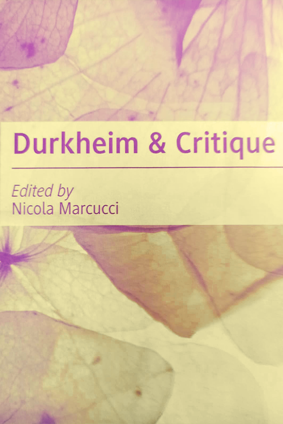
Type de publication et date de parution
OuvrageDurkheim & Critique
English version:
This book investigates the relation between Durkheim’s sociology, Critical Theory, and the philosophy of social sciences. The book is organized in four sections: confronting Durkheim and other critical traditions; inquiring his social and critical ontology; interrogating the relation between social practices and justice; and discussing his relevance in contemporary politics and political theory. An international group of philosophers, sociologists, and critical theorists contribute to show Durkheim’s reflection as an important complement—or an alternative—to the Hegelian-Marxist and post-structuralist conceptions of social critique. In this way, the book intends to inaugurate a new reflection on social critique at the intersection between philosophy and sociological theory.
With the contributions of Francesco Calegaro, Julia Christ, Bruno Karsenti, Nicola Marcucci and Cyril Lemieux, for the LIER-FYT.
Version française :
Cet ouvrage enquête sur la relation entre la sociologie de Durkheim, la Théorie Critique et la philosophie des sciences sociales. Il se divise en quatre parties : confronter Durkheim et d'autres traditions critiques ; questionner son ontologie sociale et critique ; interroger la relation entre les pratiques sociales et la justice ; et débattre de sa pertinence dans les politiques contemporaines et la théorie politique. Un groupe international de philosophes, sociologues et théoriciens critiques contribuent à décrire la réflexion de Durkheim comme un complément — ou une alternative — aux conceptions hégéliennes-marxistes et post-structuralistes de la critique sociale. Ainsi, l'ouvrage vise à amener une nouvelle réflexion sur la critique sociale, à mi-chemin entre la philosophie et la théorie sociologique.
Avec, pour le LIER-FYT : Francesco Calegaro, Julia Christ, Bruno Karsenti, Nicola Marcucci et Cyril Lemieux.